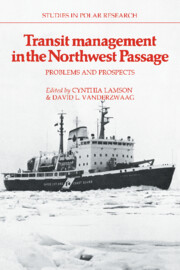APPENDIX: Statement on Canadian sovereignty
Published online by Cambridge University Press: 26 March 2010
Summary
Statement in the House of Commons by the Secretary of State for External Affairs, the Right Honourable Joe Clark, on Canadian Sovereignty (10 September 1985).
Mr Speaker,
Sovereignty can arouse deep emotion in this country. That is to be expected, for sovereignty speaks to the very identity and character of a people. We Canadians want to be ourselves. We want to control our own affairs and take charge of our own destiny. At the same time, we want to look beyond ourselves and to play a constructive part in a world community that grows more interdependent every year. We have something to offer and something to gain in so doing.
The sovereignty question has concerned this government since we were first sworn in. We have built national unity, we have strengthened the national economy, because unity and strength are hallmarks of sovereignty, as they are hallmarks of this government's policy and achievements.
In unity and strength, we have taken action to increase Canadian ownership of the Canadian petroleum industry. We have declared a Canadian ownership policy in respect of foreign investment in the publishing industry. We have made our own Canadian decisions on controversial issues of foreign policy – such as Nicaragua and South Africa. We have passed the Foreign Extraterritorial Measures Act to block unacceptable claims of jurisdiction by foreign governments or courts seeking to extend their writ to Canada. We have arrested foreign trawlers poaching in our fishing zones.
- Type
- Chapter
- Information
- Transit Management in the Northwest PassageProblems and Prospects, pp. 309 - 314Publisher: Cambridge University PressPrint publication year: 1988

